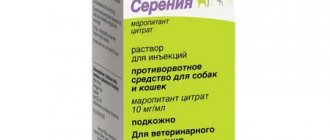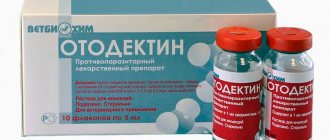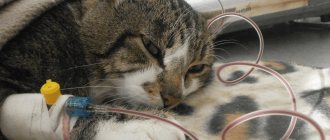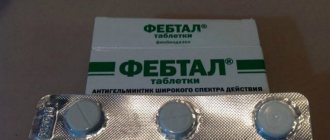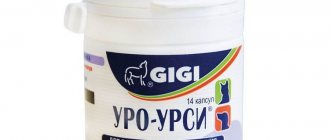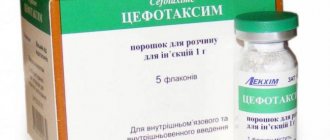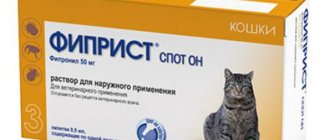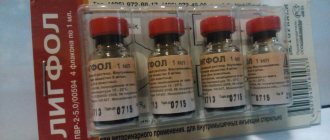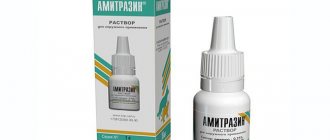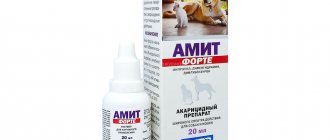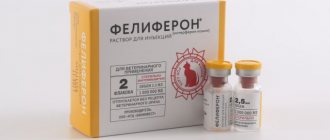The liver is a vital and largest gland in a dog, located in the abdominal cavity. Failures in its operation lead to serious health problems, in particular to the accumulation of toxic substances in the body. To restore its functions, hepatoprotectors are used. Hepatovet for dogs is considered one of the most effective. The drug is prescribed for the prevention and treatment of liver disorders of any origin.
The product is a suspension for giving to an animal orally. It has a specific smell that dogs usually like. Packaged in bottles of 50 or 100 ml. Each package of the drug contains a measuring cap or a dosing syringe. The drug is produced by the Moscow veterinary company Api-San.
Description of the drug Gepatovet
Hepatovet is a veterinary drug that is used to improve the condition of the liver and its detoxification. This hepatotropic medicine is produced by the Russian organization NPO Api-San LLC (Moscow region).
Composition of the drug
The composition of 1 ml of medicine includes the following components:
- essential phospholipids - 60 mg;
- methionine - 100 mg;
- L-ornithine - 50 mg;
- milk thistle extract - 15 mg;
- immortelle herb - 15 mg;
- potassium sorbate - 1.5 mg;
- sodium benzoate - 1.5 mg;
- sodium carboxymethylcellulose - 1.5 mg;
- Tween-80 - 6 mg;
- distilled water - up to 1 ml.
Due to the combination of active ingredients, the non-proprietary name of Hepatovet is Lecithin + methionine + ornithine + milk thistle + immortelle
Release form of the drug
Gepatovet is available in the form of a cloudy orange suspension for oral administration. The drug is packaged in brown glass bottles of 25 or 35 milliliters. Each bottle has a threaded plastic cap and is packaged in a cardboard box. On its front side there is a face of a gray cat, as well as the inscriptions:
- name of the manufacturer Api-San;
- name of the drug;
- prescription of the drug;
- nominal volume of the bottle.
All names (except Api-San) are white on an orange background. The composition, storage conditions and expiration date are indicated on the side of the box. There is a barcode at the bottom, and on the lid there is the date and series of production.
Storage conditions for the medicine
The manufacturer recommends storing Hepatovet in its original packaging in a place protected from moisture, heat and direct sunlight. The cat owner should immediately ensure that children and pets do not have access to the drug. Some people place Hepatovet in the refrigerator, since the optimal storage temperature cannot be above +25 °C and below +2 °C.
The shelf life of the drug is 2 years from the date of production. But if you open the bottle, the seal of the package is broken - in this case, the shelf life is reduced to 21 days. A drug that has expired must be disposed of. The bottle cannot be used for household purposes.
Do not leave the medicine in open places - it must be stored in a medicine cabinet or refrigerator
Composition and pharmacological properties
The drug contains the following substances:
Active components:
- methionine – 100 mg/1 ml;
- Essential phospholipids – 60 mg/1 ml;
- L-ornithine – 50 mg/1 ml;
- milk thistle extract – 15 mg/1 ml;
- immortelle extract – 15 mg/1 ml;
Minor components:
- Tween-80 – 6 mg/1 ml;
- distilled water – 1 ml;
- sorbate K – 1.5 mg/1 ml;
- Na benzoate – 1.5 mg/1 ml;
- carboxymethyl cellulose Na – 1.5 mg/1 ml.
The complex effect of the constituent flavonoids, amino acids and phospholipids allows you to normalize the condition of the liver and its ability to detoxify due to the accelerated regeneration of its cells, helps restore the structure of hepatocytes, and also reduces the level of ammonia in the body.
Effect of the drug
The amino acid methionine, which is part of Hepatovet, allows you to quickly break down fat that comes with food, which has a beneficial effect on cholesterol in the blood, in addition, it promotes the production of lecithin and accelerates the transport of Se and Zn.
By normalizing the condition of the liver, methionine relieves skin itching and redness, and also reduces hair loss that was caused by problems with this organ.
- L-ornithine accelerates cell regeneration, insulin production, helps neutralize the resulting ammonia, and allows you to achieve acid-base balance. Its purpose is to combat jaundice, encephalopathy, and hepatitis.
- Phospholipids normalize the activity of liver enzymes, neutralize fats, cholesterol, and improve metabolism. They also remove accumulated toxins, stabilize bile levels and protein metabolism.
- Milk thistle extract cleanses the liver and has a choleretic effect by removing toxins formed after food, infectious or drug intoxication.
- Immortelle in the drug helps improve bile secretion, relieve spasms and pain, and vomiting. It also helps restore the structure of hepatocytes.
Indications for use
Hepatology may be prescribed by a veterinarian in the following cases:
- Liver diseases in acute or chronic phase;
- To neutralize the negative effect of medications on the liver;
- After suffering infectious diseases;
- to eliminate the negative effects resulting from improper feeding, poisoning or intoxication;
- After treatment with agents against external and internal parasites;
- In case of disturbances in the gastrointestinal tract (belching of bile, vomiting, nausea, bloating, lack of appetite);
- In case of yellowing of the whites of the eyes.
Indications for use of the drug
Hepatovet for cats is prescribed in the following cases:
- for acute and chronic liver diseases (hepatitis, lipidosis, cirrhosis, etc.);
- as an adjuvant in the treatment of helminthic infestations;
- during the use of tablets that have a toxic effect on the liver (for example, during treatment of cancer);
- in the presence of infections that are characterized by intoxication of the body.
Hepatovet is a complex drug that has a pronounced effect, so it is not recommended to use it without consulting a veterinarian. If it is not possible to take your cat to the clinic, at least call the veterinarian on duty.
I have long made it a habit to keep the veterinary clinic’s business card in a visible place. One of them lies right in the first aid kit with cat medicines. And the second one (with the veterinarian’s mobile phone number) hangs on the refrigerator. This is also very convenient because noticing the business card every day makes it difficult to forget, for example, about the next vaccination. By the way, you can keep the veterinarian’s notes right there.
Purpose
The liver is an important organ for the animal, which is involved in the processes of hematopoiesis and the production of nutrients. The liver cleanses the blood of toxins for their subsequent removal from the body. Here the enzymes necessary for digesting food are produced.
The work of the liver is ensured by hepatocytes, of which 3/4 the organ consists. Cell functions include:
- breakdown of carbohydrates, protein synthesis;
- detoxifying effect, binding and removing toxins from the body;
- synthesis of phospholipids.
Phospholipids are the “building material” for liver cells. They provide the functions of the organ, but are too vulnerable. Under the influence of external factors, for example, toxic substances, medications, acute or chronic pathologies can develop in the liver.
Acute diseases include hepatitis. This is an inflammatory disease characterized by necrotic processes. When they occur, hepatocytes die, metabolic processes are disrupted, and the protective barriers of the liver are reduced. Depending on the causes of inflammation, toxic, allergic, and infectious hepatitis are distinguished. In the first case, organ damage is caused by poisoning, most often with poisons of mineral origin, which are used in baiting rodents. This danger awaits cats that hunt mice and rats.
The causes of toxic hepatitis can be poisoning by poisonous plants, feeding with low-quality feed contaminated with pathogenic fungi, taking certain medications, in particular antibiotics.
Infectious hepatitis develops against the background of viral diseases. Both primary lesion and secondary infection are diagnosed as a complication of a bacterial or parasitic disease. Viral hepatitis is often a concomitant disease with leptospirosis, toxoplasmosis, panleukopenia, and chlamydia. This is explained simply: the liver accumulates waste products of pathogenic microorganisms and fungi, an increased concentration leads to intoxication of the body.
Allergic hepatitis can also become complications of infectious diseases and poisoning. The inflammatory process can also be caused by stagnant processes in the bloodstream, decreased immunity, exhaustion, and chronic diseases. To help the liver cope with increased stress and restore the functioning of the organ, veterinarians prescribe hepatoprotectors, for example, Hepatovet.
The most characteristic symptom of hepatitis in pets is yellowing of the mucous membranes and sclera. In addition, your pet can observe:
- increased body temperature;
- decreased appetite or refusal to eat;
- increased thirst;
- vomiting;
- diarrhea followed by constipation;
- yellow-gray stool;
- rich yellow-brown color of urine;
- exhaustion of the body.
The cat's stomach becomes painful, any touching it causes a negative reaction from the animal.
In addition to general signs, some types of hepatitis may have characteristic symptoms. For example, allergic hepatitis is characterized by skin itching and urticaria. If left untreated, the pathology becomes chronic. The disease is characterized by periodic exacerbations with inflammatory processes in the abdominal cavity, increased bleeding against the background of hemorrhagic diathesis.
Complications of untreated hepatitis can include:
- lipidosis – accumulation of fat in an organ, gradual replacement of its tissue structures with fatty ones;
- liver encephalopathy due to high concentrations of ammonia and other toxins, which leads to brain damage;
- chronic cholangiohepatitis, which has a tendency to degenerate into liver cancer.
Older cats are more susceptible to chronic pathologies. The danger of liver diseases is that they often do not show themselves for a long time, and when visible symptoms appear, the vital organ is 80% destroyed
But you can help your pet; it is important to maintain liver function during infectious diseases, exposure to toxic substances, and taking medications, many of which have a negative effect on the liver.
Hepatovet is used:
- for any liver diseases to maintain organ functions and restore hepatocytes;
- in case of poisoning with poor-quality food, chemicals;
- to neutralize the negative effects of medications on the liver;
- after antiparasitic treatment;
- for disorders of the gastrointestinal tract, etc.
Mechanism of action of the drug
The complex of flavonoids, amino acids and essential phospholipids contained in the drug has a beneficial effect on the condition of the organ as a whole. The active substances stimulate the detoxification function of the liver and can accelerate the restoration of its cells.
Milk thistle’s ability to treat the liver has been known for a long time - most natural hepatoprotectors are based on its extract
The liver consists of 60–80% hepatocytes. If these cells become damaged or poisoned, the liver stops functioning properly. Hepatocytes are not prone to active regeneration, and the Hepatovet formula is designed in such a way as to restore and preserve these cells.
Hepatovet improves the condition of the liver, especially the organ’s ability to bind and remove toxins, preserves and restores the structure of liver cells, accelerates the process of restoration of already damaged hepatocytes, etc.
Natalya, forum user, veterinarian
https://www.babyblog.ru/community/post/petsandcats/1717171
How to take care of an animal
The appearance of an animal is the main indicator of health. A healthy animal is one that is fed properly. Due to an incorrect diet, in which vitamins and minerals are either absent or in excess, the coat can become pale and often shed.
In the natural environment, animals do not have problems with nutrition, as they regulate their diet instinctively. By consuming meat, fat, and bones, animals provide themselves with the necessary nutrients. Owners must take care of pets and develop their menu independently. You can consult with specialists.
Ready-made food should be designed specifically for your dog breed and age in order to satisfy the animal. Vitamin and mineral supplements should be taken alternating between general and specific medications. The alternation interval is 2-3 weeks.
Thanks to vitamins, the animal will be in good tone, will be able to quickly recover after childbirth or mating, will tolerate stress more easily, and will better get in shape. Owners of long-haired animals will especially need to take care of their appearance. Also, during the spring molting, vitamins can affect the intensity of the process.
Hepatovet for dogs is a reliable protector of a healthy liver. Take care of proper nutrition for your animal today. But good nutrition is not everything
It is important to choose a drug that takes care of the condition of the liver and helps maintain the health of the dog.
Currently reading:
- Thyroid dysfunction in dogs (hypothyroidism)
- Seven Signs and Remedies for Getting Rid of Fleas in Dogs
- Is it worth it or not to include natural food in your dog’s diet?
- How to recognize signs of dog poisoning from rat poisons
Features of the use of Hepatovet in cats
Hepatovet, like any other suspension, tends to “settle”, so the medicine must be shaken well before use. The suspension can only be given orally. In general, Hepatovet smells like raw beef liver, so most cats accept it willingly. However, the manufacturer has provided for cases when an animal refuses to swallow an incomprehensible liquid:
- you can use a spoon or syringe and inject the suspension directly into the mouth (closer to the throat);
- It is possible to add the required dose to wet food.
My sister has a cat, Donut. A couple of years ago he was diagnosed with urolithiasis. By hook or by crook, the cat was cured, although he had to be put on a diet for chronic renal failure. Closer to recovery, the veterinarian prescribed Hepatovet. The suspension was supposed to mitigate the undesirable effects of drugs on the liver. But Donut refused to swallow it. To “shove” a single dose into the pet, they bought him delicious wet food. The cat quickly realized that this was a trick. Attempts to pour the medicine with a spoon ended in a dirty cat's chin and scratches on the hands of the head of the family. Judging by our experience, only a syringe helps.
Video: how to give a cat a slurry to drink
Table: dosage selection
| Cat body weight | Single dose | Daily dose |
| Kittens and cats up to 3 kg | 1 ml | up to 3 ml |
| Animals from 3 to 6 kg | 2 ml | up to 6 ml |
| Big cats from 7 kg | 3 ml | 7–9 ml |
Treatment regimen
Typically, the daily dose of Hepatovet is divided into 2-3 doses (for example, in the morning, at lunch and in the evening). Treatment can be long - up to 5 weeks . The shortest duration of therapy is 21 days. If necessary, the course can be repeated after 15–20 days. Before doing this, it is necessary to consult a veterinarian - perhaps the drug should be replaced.
Features of use in pregnant cats and kittens
The undoubted advantage of the drug Hepatovet is that it can be used to treat kittens, pregnant and lactating cats.
Limitations in use
Contraindications to the use of Hepatovet are:
- severe form of liver failure;
- epilepsy;
- intolerance to the components of the drug.
Side effects
If you use Hepatovet strictly according to the instructions and in accordance with the recommendations of the veterinarian, there will be no side effects. Some cat owners panic when the cat's salivation increases after using the medicine, but the manufacturer assures that such a reaction to the hepatoprotector is normal. This goes away without any intervention.
The only side effect may be the cat's allergy to the drug. In this case, the use of Hepatovet is stopped, and the cat is prescribed antihistamines (consultation with a specialist is needed).
Increased salivation is not a side effect
Personal prevention measures
When using a hepatoprotector, the cat owner must follow the safety rules:
- Before starting to work with the drug and after finishing, you need to wash your hands with soap;
- Only a clean spoon should be used to administer the medicine;
- if the cat's owner is allergic to any component of the medication, it is necessary to wear gloves when working;
- You can use a medical mask.
My father's side of the family passed on to me a tendency toward allergies of various kinds, so I have a special relationship with medications. However, I don’t use gloves: allergies do not affect the skin in any way, and besides, they are uncomfortable, especially when working with a cat. But I have to use a medical mask, since a reaction can occur specifically to volatile substances. If the mask breaks or becomes unusable, I use a bandage folded in several layers.
Side effects
As already mentioned, side effects are rare for this drug. Most often, animals calmly accept the suspension. However, there are cases when cats develop hypersalivation a few minutes after using Hepatovet. In this case, the effect eliminates itself and does not require additional measures.
Allergic reactions deserve special attention. If the cat has any difficulties with the perception of individual components of the drug, its use should be discontinued. If, after taking Hepatovet, the cat vomits or other allergy symptoms appear, it can be judged that there is an individual intolerance to the active substances of the suspension.
Contraindications for use
To avoid negative reactions and side effects, you should also pay attention to the contraindications that are indicated in the instructions. The medicine is not suitable for cats with:
- too high sensitivity to the components of the drug;
- epilepsy;
- hepatic encephalopathy.
In such cases, a replacement for Hepatovet should be found. For example, it could be Liarsin. In any case, you should consult a veterinarian before use.
Analogues of the drug
Hepatovet has no absolute analogue. But in pharmacies there are drugs with a similar composition and similar medicinal properties:
- Hepatojekt;
- Hepatolux;
- Heptral (human drug, but often used in veterinary medicine);
- Legaphyton 50 (Legaphyton 50);
- Kovertal;
- Carsil.
Photo gallery: similar hepatoprotectors
Hepatoject is sold in bottles of 20 or 100 ml
Hepatoprotectors in tablets are cheaper than suspensions
Heptral was developed for treating humans, but due to the lack of the necessary medicine, veterinarians sometimes prescribe it
Legafiton is quite rare, but it can be ordered from online pharmacies
Covertal is sold in bottles of different sizes (from 10 to 100 ml)
Table: comparison of analogues
| Name of hepatoprotector | Development organization | Dosage form | Indications for use | Limitations in use | Price |
| Hepatoject | "Api-San", Russia | Injection | Chronic and acute liver diseases, toxicoses and consequences of past illnesses | Sensitivity to the components of the drug | From 560 rubles for 20 ml |
| Hepatolux | Agrobioprom, Russia | Tablets, suspension | Diseases of the liver, gall bladder and biliary tract, intoxication, dehydration | Drug intolerance, hepatic encephalopathy, acute renal failure | From 240 rubles for 30 tablets |
| Heptral | Abbott Laboratories, Germany | Tablets, injection solution | Chronic and acute liver diseases of various etiologies | Sensitivity to the components of the drug | From 1400 rubles for 20 pieces |
| Legafiton 50 | Vetoquinol, France | Pills | Various liver diseases and prevention of its pathologies | Intolerance to components, severe renal failure | From 450 rubles for 24 tablets |
| Covertal | "AlexAnn", Russia | Injection | Hepatitis, gastritis, fatty degeneration and other liver pathologies | Intolerance to the drug components | From 260 rubles for 10 ml |
| Karsil | Sopharma Ad, Bulgaria | Dragee in a shell | Cirrhosis, hepatitis, intoxication and other liver diseases | Pathologies of the uterus and mammary glands, hypersensitivity to the components of the drug | From 350 rubles for 80 pieces |
Owner reviews
We used it 2 times a day for two weeks, it became much better: the food was digested, she became much more vibrant and even plumper.
innnnusik, forum user
https://irecommend.ru/content/pomogaet-pecheni-moei-koshki-usvaivat-pishchu
Spiders are best suited for this; they smell similar and are quite liquid. Ours was accustomed to natural medicine, and here, in the third week of treatment, problems began to arise: the cat stopped liking the taste of Hepatovet and had to use his imagination to push the medicine in. But it was worth it. After the course of treatment, the cat became more mobile, and his stomach, especially where the liver used to protrude, became smaller.
Ronda, forum user
https://otzovik.com/review_582499.html
The clinic said that cats use Hepatovet with pleasure, but mine doesn’t want to, so I have to force it in.
Natalya Ivanovna, forum user
https://www.zooproblem.net/forum/forum28/topic513/messages/?PAGE_NAME=rules&PAGEN_1=18
Preparing the cat for sterilization. They donated blood and the doctor advised me to start giving Hepatovet. It happened yesterday morning, I immediately wrote to the children, they bought the medicine when I came home from work, gave her the second dose, and this morning the third. And the cat suddenly began to eat intensely. In the evening they poured her a full bowl (drying RK for coons), in the morning the bowl was empty - this has never happened before. In the morning I poured a new portion for her - I attacked the food as if she had not been fed for a week.
Mammoth, forum user
https://www.mainecoon-forum.ru/showthread.php?t=36498
